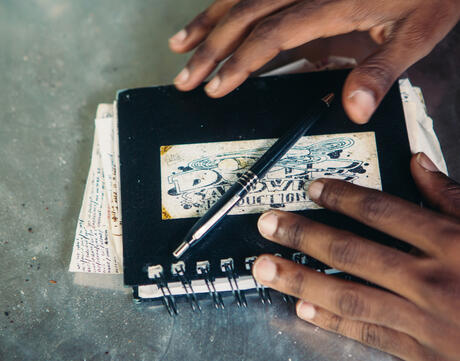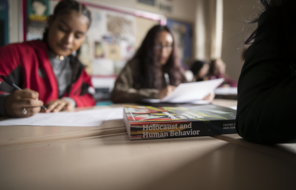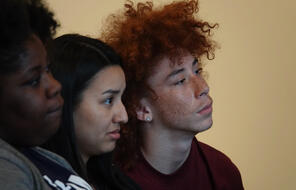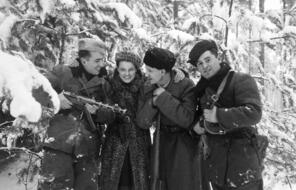
Exploring Black History through Black Poets
If you’re looking for ways to honor Black History Month this year, consider seeking out the work of Black poets.
Great poetry invites us to peek inside the emotional lives of its writers; it could be said to come as close as language can to touching all our senses. From Langston Hughes to Gwendolyn Brooks, June Jordan to Maya Angelou, Black poets throughout American history have penned poems that inspire readers to reflect, resist, and understand. Seeing the world through the eyes of great poets can alter how we see the world.
Engaging with Black poets can prompt us to reflect on Black history and the Black experience in particular. To help you get started, we have selected a few Black poets whose work provides rich insights, brilliant writing, and essential stories.
While Black History Month reminds us of the importance of Black history, these great poets deserve to be read all year round. So we hope you’ll seek these poets out throughout the year for their rich insights into the human experience.
The History of Black Poetry: Resistance and Resilience
The history of Black poetry is a rich and complex tapestry that spans continents and centuries. Black poetry is a vibrant part of the literary story of the Caribbean, Africa, the United Kingdom, and North America.
In the United States, African American poetry has long played a crucial role in both shaping the cultural landscape and challenging inequities. Poetry has often provided an important space for Black resistance. It’s also served as an outlet for expressing deep longings, losses, and hopes.
Even under the oppression of slavery, poetry gave voice to the African American experience. Most enslaved people weren’t taught to read. But spirituals, work songs, and other forms of oral poetry carried hope and resistance from generation to generation.
Examining Black spirituals as poetry and resistance for The New York Times, Kaitlyn Greenidge writes: "In an act of resistance, Black people developed a poetry around death that attempted to assign it meaning outside of commerce and biology. This imaginative leap is most on display in spirituals. These are the songs, born from rhythms of stolen labor, that enslaved Black people invented on the plantations."
After the Civil War, African American poetry continued to grow, influenced by social and cultural movements.
The Harlem Renaissance of the 1920s and 1930s was a particularly important moment in the history of African American poetry. Writers such as Langston Hughes, Countee Cullen, and Zora Neale Hurston explored themes of identity, inequality, and the African American experience. The poems of the Harlem Renaissance offer incredible insights into both Black history and being human.
Throughout the 20th century, African American poetry remained a powerful tool for activism, resistance, and cultural expression. It’s still a pivotal cultural force today.
From the Civil Rights Movement to Black Lives Matter, Black poets have used art to address the issues and injustices faced by Black communities and to celebrate their rich cultural heritage.
Some of My Favorite Poems by Black Poets
I hope by sharing what a few of my favorite poems by Black poets mean to me that you’ll find something that speaks to you too.
However, it’s important to say that my recommendations represent just a tiny sliver of what Black poets have to offer. And I’m limited by my own perspective and reading habits. So I also hope your exploration of Black history through poetry takes you to territory beyond my reading list.
“We Wear the Mask” by Paul Laurence Dunbar (1890)
This famous Paul Laurence Dunbar poem offers a window into what it was like to be an African American in post-Civil War America. It also captures a more universal human instinct: to tuck away parts of ourselves where others can’t see them. In other words, it speaks to the way “we wear the mask.”
“We Wear the Mask” is one of the first poems I can remember studying in school that spoke to me as vividly as a novel did. I read it for the first time in eighth grade, and the simplicity of Dunbar’s words immediately drew me in. But digging more deeply into the meaning of the poem with my teacher and classmates proved especially eye-opening. I began to see the magnitude of Dunbar’s struggle as a young Black man in post-Civil War America. This sparked a desire in me to more intentionally seek out diverse perspectives and grow my understanding of the ways racism has been embedded in American culture.
It’s notable that Dunbar was just 18 years old when this poem was published. His young age may be one reason why his work resonated with me so deeply in middle school.
Read “We Wear the Mask.”
Paul Laurence Dunbar
The dust of the Civil War still thickened the air when Paul Laurence Dunbar was born in 1872 in Dayton, Ohio. His mother, who was born under slavery, made it her mission to ensure Dunbar got an education. He was the only Black student in his high school class. Yet he became an editor for the school newspaper and began publishing his poetry while still a student.
Dunbar’s writing earned him accolades, but not employment. Job opportunities for educated African Americans were limited. So he had to work as an elevator operator and self-publish his first volume of poetry. By the time he died at just 33, Dunbar had become one of the most influential Black poets of his time. Learn more about Paul Laurence Dunbar and his work.
“Let America be America Again” by Langston Hughes (1936)
This poem gets to the heart of the great American paradox: that freedom for all is the American brand, but freedom for a privileged few has been the American reality. And yet this poem persists in hope. It refuses to give up on making America’s dreams and promises into reality. It also refuses to pretend it’s always been great.
Read “Let America be America.”
Langston Hughes
The poetry of Langston Hughes has helped him become one of the most influential voices from the Harlem Renaissance. In fact, Hughes is one of the first people many might think of when asked to name a great Black poet.
By the time I arrived in middle and high school, Hughes was revered. But he was also manicured into a mythological hero of poetry.
Revisiting his poetry now, I realize I was missing out on big parts of the picture. If you can relate, I encourage you to join me in exploring beyond the famous “dream deferred.” We see Hughes more holistically as a poet and a thought leader when we don’t sand away his more radical reflections on justice and identity.
It’s also helpful to consider Hughes in the context of the Harlem Renaissance. His poetry was part of bringing that era of Black history to life, and he wrote in conversation with both his own culture and his poetic predecessors. Learn more about Langston Hughes and his work.
“A Bronzeville Mother Loiters in Mississippi. Meanwhile, A Mississippi Mother Burns Bacon” by Gwendolyn Brooks (1960)
Written in response to the murder of Emmett Till, this Gwendolyn Brooks poem examines how white culture condones and even fuels racially motivated violence. At just 14, Till was lynched by white men because a white woman accused him of flirting with her. The poem adopts the perspective of a white woman in the position of Till’s accuser.
Conditioned by white Southern culture to see a young Black boy as a threat, the woman tells herself that his death at her husband’s hand was justified. Yet even as feelings of guilt, shame, and fear prompt her to doubt this narrative, she outwardly clings to the myth. She’s too afraid to confront the truth. Ultimately, she opts to protect the white Southern patriarchy.
Brooks paints the woman in this poem with humanity and nuance. But she doesn’t absolve her of guilt. The critique of white complicity is clear, and it’s a critique that remains relevant today. I admit it’s one that I need to hear sometimes.
Read “A Bronzeville Mother Loiters in Mississippi. Meanwhile, A Mississippi Mother Burns Bacon.”
Gwendolyn Brooks
While “A Bronzeville Mother Loiters in Mississippi” is not a major detour from the poetic mainstream, you may know Gwendolyn Brooks best as the poet behind “We Real Cool.” That poem—short, punchy, alliterative—has glued itself to the popular consciousness. But the poetry of Gwendolyn Brooks is made up of so much more than those few well known lines.
After all, Gwendolyn Brooks published her first poem at 13 and kept going until her death 70 years later. Her literary lifespan covered most of the 20th century. It’s fascinating to trace the ways her work changes as she responds to different moments in history. Along the way, she dances across genres of poetry with abandon and explores themes of gender, race, class, and place. Learn more about Gwendolyn Brooks and her work.
“Still I Rise” by Maya Angelou (1978)
This poem captures Maya Angelou’s resistance to the ways that society tried to hold her back from being all she could be. She counters societal attempts to reject, oppress, and confine her with a firm conviction: “Still I rise.”
I celebrate Angelou’s persistent hope and determination. She dazzles and gleams through every word, embracing who she is with honesty, courage, and joy. But I also think it’s important that we honor her resistance without overlooking or painting over why it was necessary. Angelou certainly wasn’t ignoring it. Without so many barriers, imagine who else might rise to join her?
Read “Still I Rise” or watch a live performance.
Maya Angelou
Born in 1928, Maya Angelou came of age in an America that still upheld Jim Crow. But change was coming, and Angelou was part of it. She kept this poem’s promise to “rise.” And by the time she passed away in 2014, Angelou was a multi-hyphenate powerhouse: author, playwright, activist, singer, songwriter, producer, director, civil rights activist, and of course, poet. Learn more about Maya Angelou and her work.
“Power” by Audre Lorde (1978)
“Power” was written 40 years ago, yet when Audre Lorde describes the murder of a Black child by police officers, I don't feel like I'm being transported to the past. I feel like I'm being confronted by the present. In too many ways, this is not just the poetry of Black history, but of today.
This poem traces the path of death and destruction done in the name of justice to a lethal combination: power and rhetoric. For her own part, Lorde strives to use her power differently: poetry instead of rhetoric. In a world that teems with rhetoric, endlessly optimized to get the “best” possible result, I think Lorde is onto something.
Read “Power.”
Audre Lorde
Audre Lorde was an activist whose words were (and still are) an instrument for justice. She shared what it was like to be a Black lesbian woman in America at a time when that identity often went unacknowledged.
Born in 1934 to parents who immigrated from Grenada, Lorde grew up in Manhattan and showed interest in poetry from an early age. Her work reflected the intersections of race, gender, class, and sexuality where she lived her life. Following a breast cancer diagnosis, Lorde also spoke to the challenges of cancer treatment. Sadly, she died of cancer in 1992. Learn more about Audre Lord and her work.
“Writing an Elegy” by Rickey Laurentiis (2014)
In this poem Rickey Laurentiis tugs at time through the branches of a Spanish Moss. Writing in the 21st century, their mind still connects the tree to its role in the violence of lynching. This poem explores how history’s memory shapes their perception of the present and wonders what compels them to keep returning to this part of the past.
Their poetry invites us to join them in asking big questions about how we remember history and what it can teach us about the present and future. Laurentiis writes with lyricism and simplicity. There’s beauty in their language, though the subjects they’re writing about are sometimes anything but.
Read “Writing an Elegy.”
Rickey Laurentiis
Rickey Laurentiis is a New Orleans-born trans poet who has received multiple awards for their poetry. Themes of history, memory, empathy, the South, and sexuality run through their writing. Although Laurentiis is a contemporary Black poet, their poetry’s frequent callbacks to Black history make it a great option to read during Black History Month. Learn more about Rickey Laurentiis and their work.
“litany” by Mahogany L. Browne (2016)
Mahogany L. Browne wrote this powerful poem in conversation with ‘I Wish I Knew How It Felt to Be Free’ made famous by Nina Simone in 1967. She said, “The poem was a mulling of all that has changed and all that has not.”
Browne has some of the freedom to express herself and choose who she wants to be that Simone longed for in the song. Yet she reflects that, ultimately, the freedom to express herself artistically does not liberate her from the economic realities of her life.
She grounds the poem in both her personal identity as a Black woman in America and the neighborhood she calls home. Gentrification and poverty clash as a bodega and laundromat burn down on the corner nearby. Socioeconomic lament forms a central theme in Browne’s litany. But even in the fire, persistent hope for a fuller freedom and resilience poke through.
Read “litany.”
Mahogany L. Browne
Mahogany L. Browne is a poet and activist based in Brooklyn, New York. Passionate about criminal justice reform, she leads JustMedia, a media literacy initiative designed to support the groundwork of criminal justice leaders and community members. She recently published a book-length poem dedicated to exploring the impact of mass incarceration on women and children. Learn more about Mahogany L. Browne and her work.
Discover More Great Poetry by Black Poets
Check out these websites to explore and engage with more great poetry and poets during Black History Month and beyond:
- Poets.org: This is an extensive resource for discovering poets of all backgrounds and styles.
- Split This Rock: This website not only showcases a diverse array of poets but also promotes social change through poetry.
- The Lift Every Voice Project: Dedicated to celebrating the rich tradition of African American poetry, this website is a great place to discover and engage with Black poets.
- The Poetry Foundation: This collection provides a rich space to celebrate and amplify poets and poetry.












